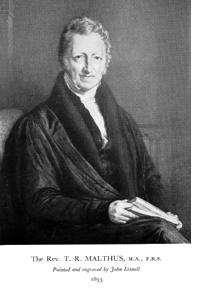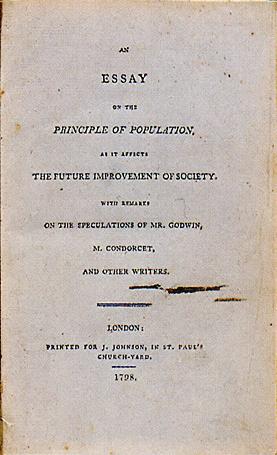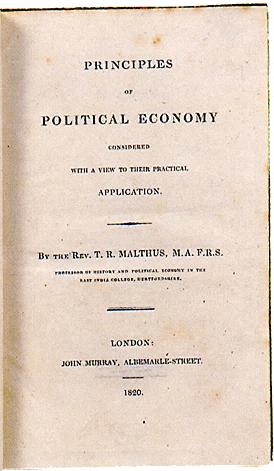Thomas Robert Malthus
Economist, b. 14 (17) February 1766 (Rookery near Dorking, Surrey, England), d. 23 December 1834 (St. Catherine near Bath).
 Thomas Malthus, the son of a prosperous family, was educated mainly at home until he entered Jesus College in Cambridge at the age of 18. He studied in various disciplines including Latin and Greek, graduated after four years in 1788 and received his Master of Arts in 1791. Two years later he was elected a fellow of the college. In 1797 he completed the steps for admission as reverend of the church.
Thomas Malthus, the son of a prosperous family, was educated mainly at home until he entered Jesus College in Cambridge at the age of 18. He studied in various disciplines including Latin and Greek, graduated after four years in 1788 and received his Master of Arts in 1791. Two years later he was elected a fellow of the college. In 1797 he completed the steps for admission as reverend of the church.
Malthus' first written work, a pamphlet of 1796 entitled "The Crisis" that remained unpublished, commented on the proposed new poor laws. It supported the law's provision of workhouses for the poor to alleviate their plight.
Two years later Malthus' view on the poor had changed entirely. He published the pamphlet An Essay on the Principle of Population as it affects the Future Improvement of Society, with Remarks on the Speculations of Mr. Godwin, M. Condorcet, and other Writers. The work appeared anonymously, but its immediate success caused Malthus to develop the pamphlet into a book, which he published under his name in 1803. The sixth edition of the work appeared in 1826.
The population theory developed in the work claimed that the population always increases in geometric progression, while the means of subsistence will always increase in arithmetical progression. Food demand will therefore always outstrip food supply, and population growth will always be checked by starvation, war and disease. Malthus now declared that the poor laws only prolonged the general misery, if they had "never existed, though there might have been a few more instances of severe distress, the aggregate mass of happiness among the common people would have been much greater than it is at present."
Malthus' population law was without scientific foundation, and the voluminous empirical data added to successive editions of his work did nothing to prove its validity. Yet it was accepted by economists and politicians, led to a reduction in traditional charity and served as argument for the determination of wages at the bare minimum.
Two years after publication of the Principle of Population under his name Malthus was appointed professor of history and political economy to the East India Company's college in Haileybury. It was the first teaching position of political economy in history. Malthus spent the rest of his years as professor at the company college.
In his economical theory, published in 1820 as Principles of Political Economy Considered with a View of Their Practical Application, he stated that a nation had to balance "the power to produce and the will to consume" if it wants to maximize wealth and avoid the problem of "gluts." As he had already relegated the poor to a life at the bare minimum of subsistence he saw the rich as the key for economic stability and proposed public and private investment and spending on luxury goods as a means to increase prosperity. His criticism of thrift, which if "pushed to excess, would destroy the motive to production," was also clearly directed towards the capitalists.
Malthus was held in high esteem during his lifetime. He was elected a fellow of the Royal Society in 1819, became a member of the Political Economy Club in 1821 and was elected a royal associate of the Royal Society of Literature in 1824. The French Académie des Sciences Morales et Politiques and the Prussian Royal Academy admitted him in 1833.
Reference
MacRae, D. G. (1995) Thomas Robert Malthus, Encyclopaedia Britannica 15th ed.

Title page of the anonymous pamphlet of 1798.

Title page of Malthus' book of 1820 after his election to the Royal Society.
home
 Thomas Malthus, the son of a prosperous family, was educated mainly at home until he entered Jesus College in Cambridge at the age of 18. He studied in various disciplines including Latin and Greek, graduated after four years in 1788 and received his Master of Arts in 1791. Two years later he was elected a fellow of the college. In 1797 he completed the steps for admission as reverend of the church.
Thomas Malthus, the son of a prosperous family, was educated mainly at home until he entered Jesus College in Cambridge at the age of 18. He studied in various disciplines including Latin and Greek, graduated after four years in 1788 and received his Master of Arts in 1791. Two years later he was elected a fellow of the college. In 1797 he completed the steps for admission as reverend of the church.
